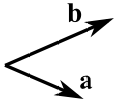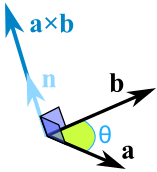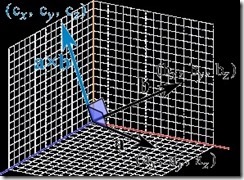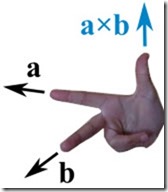Cross Product
Cross Product
These are two vectors:
They can be multiplied using the "Cross Product"
(also see Dot Product)
The Cross Product a × b of two vectors is another vector that is at right angles to both:
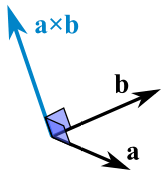
And it all happens in 3 dimensions!
Calculating
We can calculate the Cross Product this way:
a × b = |a| |b| sin(θ) n
- |a| is the magnitude (length) of vector a
- |b| is the magnitude (length) of vector b
- θ is the angle between a and b
- n is the unit vector at right angles to both a and b
So the length is: the length of a times the length of b times the sine of the angle between a and b,
Then we multiply by the vector n to make sure it heads in the right direction (at right angles to both a and b).
OR we can calculate it this way:
When a and b start at the origin point (0,0,0), the Cross Product will end at:
- cx = aybz − azby
- cy = azbx − axbz
- cz = axby − aybx
Example: The cross product of a = (2,3,4) and b = (5,6,7)
- cx = aybz − azby = 3×7 − 4×6 = −3
- cy = azbx − axbz = 4×5 − 2×7 = 6
- cz = axby − aybx = 2×6 − 3×5 = −3
Answer: a × b = (−3,6,−3)
Which Way?
The cross product could point in the completely opposite direction and still be at right angles to the two other vectors, so we have the:
"Right Hand Rule"
With your right-hand, point your index finger along vector a, and point your middle finger along vector b: the cross product goes in the direction of your thumb.
Dot Product
The Cross Product gives a vector answer, and is sometimes called the vector product.
But there is also the Dot Product which gives a scalar (ordinary number) answer, and is sometimes called the scalar product.
Question: What do you get when you cross an elephant with a banana?
Answer: |elephant| |banana| sin(θ) n


